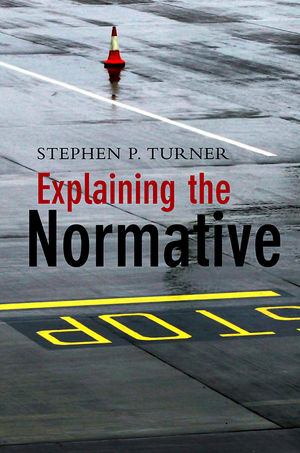Explaining the NormativeISBN: 978-0-7456-4255-0
Hardcover
240 pages
May 2010, Polity
 Other Available Formats: Paperback
|
||||||
"When it comes to producing thought-provoking pieces of academic
writing, Stephen Turner is indefatigable. More than this, the
quality never slips."
Thesis Eleven
"A very important stimulating addition to current philosophical
discussion; it presents arguments every normativist should come to
grips with."
Organon
"Turner has done contemporary philosophy and social science a great
service by holding up a mirror to some forms of normativism; he has
given it the best gift one can: geniunely struggled with it, tried
to give it voice, and then said how he feels about it. He has also,
in his best moments, helped create a clearing where more fruitful
dialogue between normativism and naturalism can take place. Let us
wait and see whether those who identify with normativism can come
to meet him there."
Human Studies
"Turner's very clear and measured writing can easily underplay
the significance of his message, which needs to be taken very
seriously by anyone concerned about the future of philosophy and
the social sciences."
Times Higher Education Supplement
"This book does to the many overblown claims concerning
'normativity' what Turner previously did against fashionable ideas
of 'social practices': throws cold water on extravagant claims made
on behalf of norms as a distinctive and unavoidable basis for
social inquiry. The real strength of this analysis is the way that
Turner shows that the current debates about norms have a long
history, the consideration of which is essential to understanding
the current discussion for good or ill. The book is certainly the
best of its kind and an important contribution."
James Bohman, Saint Louis University
"This is the most systematic discussion of normativity by a
social theorist (or philosopher of the social sciences). The
argument is forceful and original throughout. Turner brings
together considerations from a variety of different fields -
philosophy of law, philosophy of the social sciences, philosophy of
mind and language, cognitive science - and these different strands
re-enforce and strengthen one another. It is particularly
intriguing to see how philosophers defending normativity have in
many ways 're-invented the normative wheel' that some social
theorists have used for a long time. This book should be obligatory
reading for philosophers and social scientists alike."
Martin Kusch, University of Vienna



